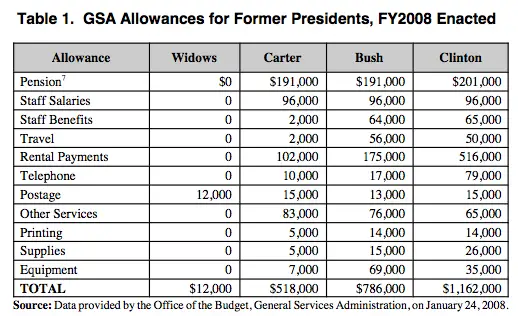With all of the talk of pay freezes in recent weeks, questions from readers have been routinely popping up about the pay of elected officials. As I noted in a recent article, Congress has frozen its own pay for last year and the current fiscal year.
We have also received questions from readers regarding the pay of the President, specifically with regard to putting a freeze on his pay. I got curious about this and did some research; I know that the President makes $400,000 in annual salary, but how long has that been the case, and what was the last raise for that position?
The president of the United States has been paid this salary since January 20, 2001, so the position hasn’t seen a pay increase in a while. That, of course, covered most of George Bush’s presidency and now is the pay rate for Barack Obama. Prior to this date, the president made $200,000 per year, so the salary saw a 100% increase last time it was adjusted. Not bad. However, 1969 was when the $200,000 annual salary was first put into effect, so it didn’t change for 32 years, perhaps making a 100% increase not seem quite as outlandish. It wasn’t George Bush, however, that made the increase. In September 1999, Bill Clinton signed the Treasury and General Government Appropriations Act that authorized the increase. The relevant language from this act is as follows:
Sec. 644. (a) Increase in Annual Compensation.–Section 102 of title 3, United States Code, is amended by striking “$200,000” and inserting “$400,000”. (b) Effective Date.–The <<NOTE: 3 USC 102 note.>> amendment made by this section shall take effect at noon on January 20, 2001.
Presidential Pay History
| Date established | Salary | Salary in 2009 dollars |
|---|---|---|
| September 24, 1789 | $25,000 | $566,000 |
| March 3, 1873 | $50,000 | $865,000 |
| March 4, 1909 | $75,000 | $1,714,000 |
| January 19, 1949 | $100,000 | $906,000 |
| January 20, 1969 | $200,000 | $1,175,000 |
| January 20, 2001 | $400,000 | $487,000 |
In addition to the $400,000 annual salary, the president also gets some expense accounts: a $50,000 annual expense account, a $100,000 non-taxable travel account, and $19,000 for entertainment.
None of that is chump change, but where the presidential perks really shine is retirement benefits. Presidents get a lifetime pension that begins the day they leave office and is set annually by Congress. As of 2009, that amount is $193,400 per year.
Outgoing presidents also get funding to help with the transition back into life outside of politics. The funding is provided as part of the Presidential Transition Act of 1963 and includes monies for office space, staff, postage/packing materials, travel expenses, and communications services among other things. There are caveats on the funds, such as the travel pay must used as an official representative of the US as opposed to traveling for pleasure. The chart below shows a breakdown of some of those expenses for former presidents as of early 2008.

Former presidents and their spouses also get Secret Service protection for a maximum of 10 years if they entered office after January 1, 1997. Presidents who were in office before that date get the service for life, if they want it.
For more information on presidential retirement benefits, see http://usgovinfo.about.com/od/thepresidentandcabinet/a/presretirement.htm.
And of course being the President means being famous which can dramatically boost book sales. Both George Bush and Barack Obama are published authors. Barack Obama’s reported 2009 income on his tax return was around $5.5 million, thanks largely to book sales. George Bush’s new book has sold over 1 million copies which has undoubtedly boosted his personal income.
So, for those readers who may have felt singled out for “special consideration” with the president’s proposal to freeze federal pay for two years, it may make you feel better knowing the president does not receive an automatic annual raise. The office of the president has had a pay freeze of sorts for about 10 years, but the other benefits that come with the job may more than make up for the lack of annual pay raises.


